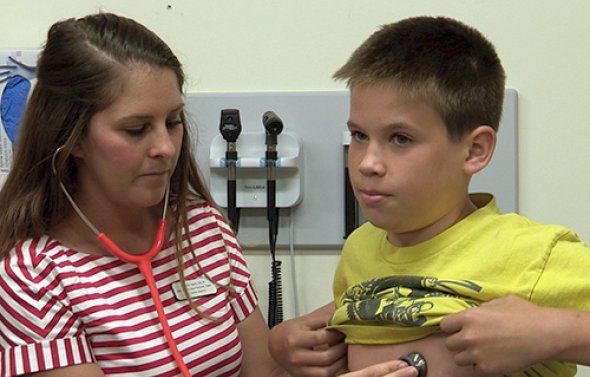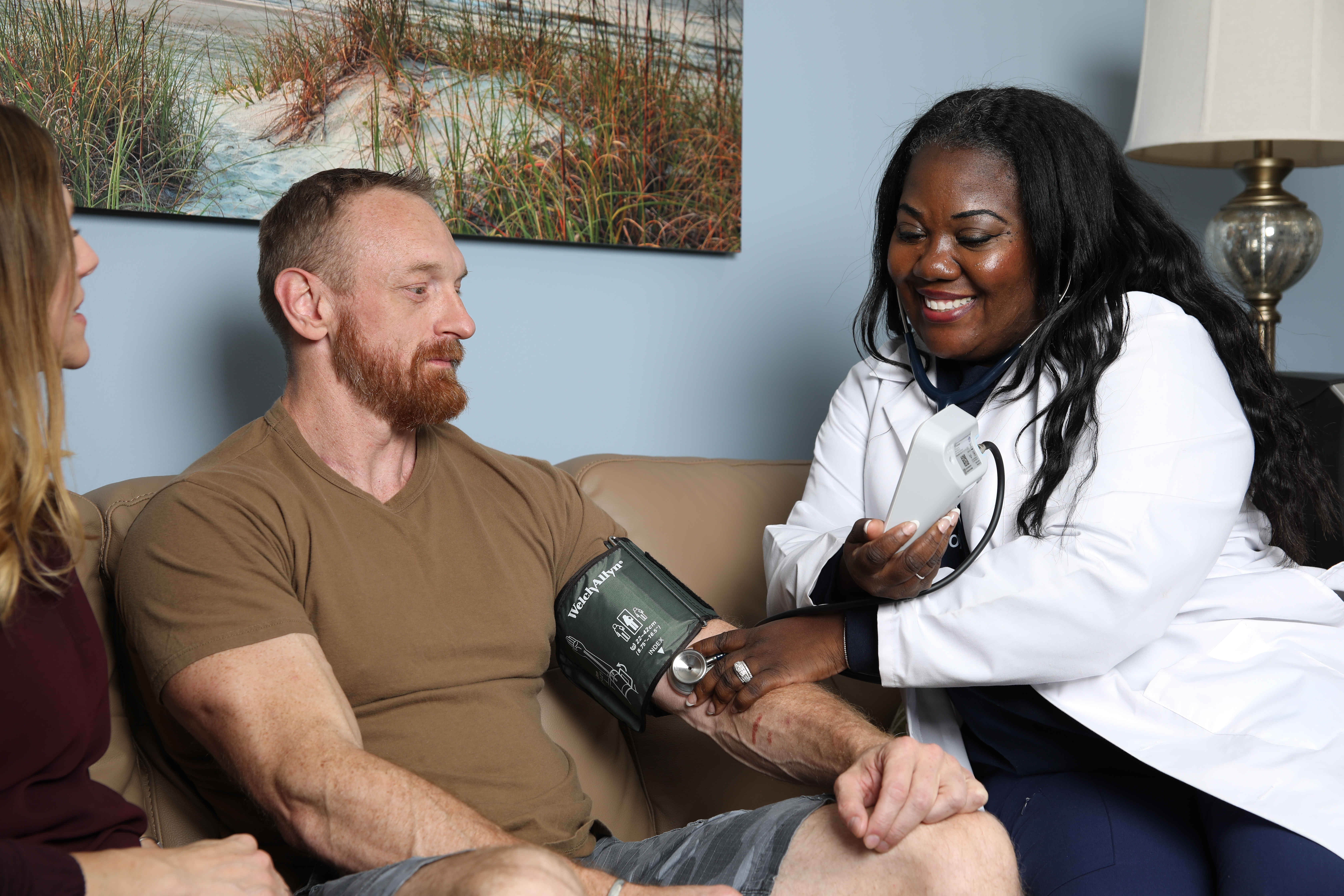Clinical Nurse Specialists are graduate prepared advanced practice nurses trained in a specialized area of nursing practice to work in a wide variety of health care settings. Area of specialty may be defined by population, setting, disease or medical subspecialty, type of care, or type of problem. Clinical Nurse Specialists:
- Provide diagnosis, treatment, and ongoing management of patients; provide expertise and support to nurses caring for patients in multiple settings;
- Help drive practice changes throughout an organization; and
- Ensure the use of best practices and evidence-based care to achieve the best possible patient outcomes.
Additionally, Clinical Nurse Specialists have the skills and expertise to identify gaps in health care delivery and help assess, design, implement, and evaluate interventions to improve the overall process of health care.
The School of Nursing offers three specialty options within the Clinical Nurse Specialist role. After completion of the program requirements for the Master of Science in Nursing (MSN), students may opt to continue in the Doctor of Nursing Practice (DNP) program (full-time or part-time). Some courses in the MSN curriculum also meet requirements for the DNP.
Program Data
| Statistics | 2023 | 2022 | 2021 |
|---|---|---|---|
| Degree Completion Rate | 94% | 100% | 100% |
| Certification Pass Rate | 100% | 92.3% | 88% |
| Employment Rate | 100% | 100% | 100% |
The Adult Gerontology Clinical Nurse Specialist/Educator program prepares graduate students to provide patient-centered quality care and improve health outcomes for young adults (including late adolescents and emancipated minors), adults and older adults (including young-old, old, and old-old adults). The student practicum experience is guided by the Adult-Gerontology CNS Core Competencies. Students explore practice models, standards and regulations that direct advanced nursing practice as well as design, implement and evaluate evidence-based nursing assessments, interventions, and programs. The spheres of influence for CNS practice are used as a framework for exploration of approaches to patients/families, communities, populations, and organizations. Emphasis is placed on advanced clinical practice knowledge, leadership, and integration of technology into practice within the complex healthcare system. Students also receive preparation as nurse educators, and are therefore dually prepared for clinical and academic roles.
Frequently Asked Questions
The CNS program is offered online with the exception of standardized patient experiences for specific courses (advanced physical assessment, Aging in the 21st century, and Clinical practicums), an interprofessional experience, and the comprehensive exam. Additionally, an educator internship course that focuses on classroom instructional strategies is required for the Adult-Gerontology CNS/Educator track. Courses are delivered via Canvas, the University course management system.
The CNS program requires 504 hours of clinical experience with faculty approved preceptors in a variety of settings based on the age specific role. Adult-Gerontology practicums include an acute care/hospital based setting, geriatric focused setting, and ambulatory care setting. Pediatric practicums include an acute care/hospital based setting and ambulatory care setting. Neonatal practicums include an acute care/hospital based setting.
Additionally, a nurse educator/faculty internship is required for the Adult-Gerontology CNS/Educator track. This internship is focused on classroom instruction and 168 hours are required, where students work with an experienced master's prepared nursing faculty member who has primary teaching responsibility in an entry level nursing program (Diploma, Associate, or Baccalaureate).
Old Dominion University School of Nursing has a Student Clinical Services Coordinator who assists the Program Directors and the student to locate appropriate clinical and educator internship sites, and ensures that the appropriate agreements are in place. CNS/educator students are strongly encouraged to identify potential clinical and educator internship sites for these experiences prior to the beginning of the program.
Yes, all students enrolled in the Adult-Gerontology CNS/Educator track must complete the educator internship, even if employed in a teaching position in an entry-level nursing program while enrolled as a student in the CNS Program. For students with prior teaching experience, we strongly encourage internship placements in a school different from where you are employed, and we suggest that you work with a different type of program. For example, if you teach in a LPN program, then we recommend that you intern with faculty teaching in an Associate or Baccalaureate program, or if you teach in an Associate degree program then you might consider an internship with a Baccalaureate program or a different Associate degree program.
The program director will work with students having difficulty finding practicum or internship sites. Every attempt will be made to find a placement that will provide a valuable learning experience.
The Pediatric Clinical Nurse Specialist program prepares graduate students to provide patient-centered quality care and improve health outcomes for newborns through young adults (including late adolescents and emancipated minors). The student practicum experience is guided by the Clinical Nurse Specialist Core Competencies, the Pediatric Nursing Scope and Standards of Practice, and the Pediatric CNS Competencies. Students explore practice models, standards and regulations that direct advanced nursing practice as well as design, implement and evaluate evidence-based nursing assessments, interventions, and programs. The spheres of influence for CNS practice are used as a framework for exploration of approaches to patients/families, communities, populations, and organizations. Emphasis is placed on advanced clinical practice knowledge, leadership, and integration of technology into practice within the complex healthcare system.
Frequently Asked Questions
The CNS program is offered online with the exception of standardized patient experiences for specific courses (Advanced Physical Assessment), clinical practicums, an interprofessional experience, and the comprehensive exam. Courses are delivered via Canvas, the University course management system.
The CNS program requires 504 hours of clinical experience with faculty approved preceptors in a variety of settings based on the age specific role. Pediatric practicums include an acute care/hospital based setting and ambulatory care community based setting. Old Dominion University School of Nursing has a Student Clinical Services Coordinator who assists the Program Directors and the student to locate appropriate clinical sites, and ensures that the appropriate agreements are in place.
The Student Clinical Services Coordinator and program directors will work with you to secure a clinical placement near where you live and work, if possible. You are required to have an experience in both an acute care/hospital based setting and in an ambulatory care community based setting. Therefore, clinical placement will be dependent upon the availability of facilities in your area in which pediatric CNS competencies can be met.
As long as you are meeting the required Pediatric CNS Competencies you can focus a portion of your clinical experiences in a specialty area of interest.
Most of our students have families and full-time jobs. The program is designed in a way that you can complete the didactic portion of the program around a busy life and work schedule. You will need to adjust your work schedule to allow for the 504 required clinical hours.
Applications are accepted on a rolling basis. What that means is we will review your application as soon as it arrives. You should have a response regarding acceptance within one-month of submission. However, new cohorts of students begin courses the same time each year in the Fall semester only.
The Neonatal Clinical Nurse Specialist program prepares graduate students to provide patient-centered quality care and improve health outcomes for neonates and continuously hospitalized infants through 2 years of age. The student practicum experience is guided by the Clinical Nurse Specialist Core Competencies and the Neonatal CNS Competencies. Students explore practice models, standards and regulations that direct advanced nursing practice as well as design, implement and evaluate evidence-based nursing assessments, interventions, and programs. The spheres of influence for CNS practice are used as a framework for exploration of approaches to patients/families, communities, populations, and organizations. Emphasis is placed on advanced clinical practice knowledge, leadership, and integration of technology into practice within the complex healthcare system.
Frequently Asked Questions
The CNS program is offered online with the exception of standardized patient experiences for specific courses (Advanced Physical Assessment), clinical practicums, an interprofessional experience, and the comprehensive exam. Courses are delivered via Canvas, the University course management system.
The CNS program requires 504 hours of clinical experience with faculty approved preceptors in a variety of settings based on the age specific role. Neonatal practicums are based in a Levels 3-4 NICUs. Old Dominion University School of Nursing has a Student Clinical Services Coordinator who assists the Program Directors and the student to locate appropriate clinical sites, and ensures that the appropriate agreements are in place.
The Student Clinical Services Coordinator and program directors will work with you to secure a clinical placement near where you live and work, if possible. Neonatal CNS students will complete their practicum experience in a Level 3 or 4 NICU. Therefore, clinical placement will be dependent upon the availability of facilities in your area in which neonatal CNS competencies can be met.
Neonatal CNS students must complete a general NICU training but students can decide to do additional time in other areas where these practicum experiences can be arranged.
Most of our students have families and full-time jobs. The program is designed in a way that you can complete the didactic portion of the program around a busy life and work schedule. You will need to adjust your work schedule to allow for the 504 required clinical hours.
Applications are accepted on a rolling basis. What that means is we will review your application as soon as it arrives. You should have a response regarding acceptance within one-month of submission. However, new cohorts of students begin courses the same time each year in the Fall semester only.
Program Contacts
CNS Program Director:
Pamela Bishop, PhD, RN, CNS-BC
(757) 683-5247, psharp@odu.edu
Graduate Program Coordinator:
Nicole Pomazanski
757-683-4298, npomazan@odu.ed
Apply for the Program
Advance and expand your nursing career in your preferred specialty, and drive for the best outcomes for your patients.

Within roughly eighteen months of graduating from the program, I had been offered multiple positions and received several Nursing Education awards. It is no accident that I was given as much so quickly. The rigorous program at ODU prepared me for curriculum development and delivery with a student-centered approach.
- Clarke, ODU School of Nursing Alumni
Accredited by CCNE
The baccalaureate degree program in nursing, master's degree program in nursing, and Doctor of Nursing Practice program at Old Dominion University is accredited by the Commission on Collegiate Nursing Education (http://www.ccneaccreditation.org).




